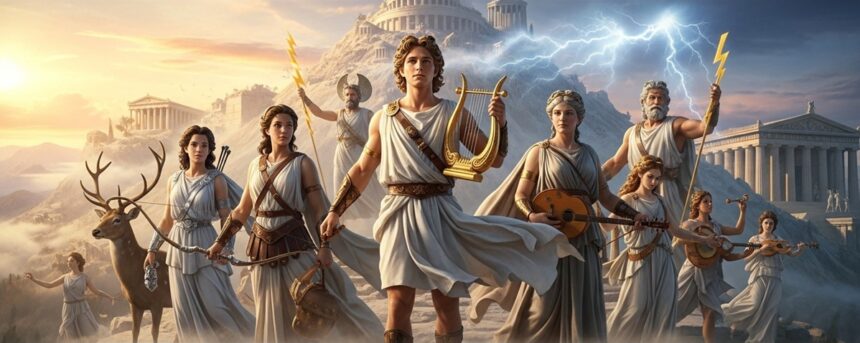Greek mythology has been sneaking its divine little self into our playlists for decades, blending eternal drama with the pulsing beats of rock, pop, and everything in between. From the fiery riffs of Led Zeppelin to the ethereal whispers of Enya, the gods of Olympus clearly developed a taste for rock and pop, proving that even immortals can’t resist a good bassline.
The Immortal Soundtrack of Olympus
Why does Greek mythology goes so well with music? It’s simple: both are timeless, dramatic, and dripping with larger-than-life characters. The gods, with their messy relationships and cosmic power trips, are basically the original rock stars. Zeus? He’s out here throwing thunderbolts like a lead guitarist smashing a Stratocaster. Aphrodite? She’s serving looks and heartbreak in every synth-pop banger. Music, like mythology, thrives on passion, betrayal, and redemption—core ingredients of every epic tale from antiquity.
Led Zeppelin’s Achilles Last Stand: A Hero’s Swan Song
Let’s kick things off with Led Zeppelin, the titans of rock who practically invented the genre’s mythical swagger. Their 1976 track Achilles Last Stand is a 10-minute epic that feels like it was ripped straight from the Iliad. With galloping drums and Robert Plant’s wail, it’s as if Achilles, the golden warrior of Troy, traded his spear for a Les Paul and stormed the stage. The lyrics channel his restless, doomed spirit, chasing glory while staring down mortality.

Picture this: Achilles, barefoot, long hair flowing, screaming “HECTOR WHO?” into a mic as Jimmy Page unleashes a guitar solo that could summon storms. The song’s relentless energy mirrors the hero’s tragic arc—invincible, yet fated to fall. It’s no wonder Led Zeppelin chose this myth; Achilles embodies the reckless, untouchable vibe of rock ‘n’ roll. If you haven’t blasted this track while imagining a Trojan War mosh pit, you’re missing out.
Aphrodite Takes the Dancefloor with Bananarama’s Venus
If Achilles is the warrior, Aphrodite, goddess of love and beauty, is the ultimate diva. Enter Bananarama’s 1986 hit Venus, a pop anthem that resurrects Aphrodite as a neon-lit, dancefloor queen. “She’s got it, yeah, baby, she’s got it,” the trio sings, and you can practically see Aphrodite gliding through a club, her hair flawless, her cheekbones sharper than Ares’ sword. This isn’t just a song—it’s a mythical makeover.

The original Venus by Shocking Blue (1969) set the stage, but Bananarama’s version cranks the goddess energy to 11. With its infectious beat and unapologetic glamour, it captures Aphrodite’s essence: irresistible, a little dangerous, and always in control. If she were around today, Aphrodite would be dominating Instagram, launching a makeup empire, and probably clapping back at Hera in a Twitter feud. Bananarama knew exactly what they were doing when they crowned her the queen of pop.
Sting’s Scylla and Charybdis: A Mythical Breakup Anthem
Sting has always had a knack for blending brains with brooding, and his 1983 track Wrapped Around Your Finger with The Police is no exception. Here, he casually name-drops Scylla and Charybdis, the monstrous duo from The Odyssey who terrorized sailors (and probably ghosted Odysseus at a poetry slam). The song’s lyrics—“You consider me the young apprentice / Caught between Scylla and Charybdis”—paint a picture of being trapped between impossible choices, a nod to Odysseus’ perilous journey.

This is a vibe—intellectual, a little tortured, and definitely wearing too much cologne. If Odysseus had a synthesizer, this would be his breakup anthem, full of longing and existential dread. Sting’s ability to weave Greek mythology into a pop-rock hit proves that the gods’ stories are universal, whether you’re navigating a stormy sea or a messy relationship.
The Dreamy Depths of Myth
Not every mythical song needs a specific god or hero. Sometimes, the vibe itself is divine. Take Beach House’s 2012 track Myth, a shimmering, dream-pop masterpiece that feels like it was written by Orpheus after a rough night in the Underworld. The lyrics don’t explicitly reference Greek mythology, but the mood—haunting, introspective, and laced with longing—captures the essence of a mythical tale.

Listening to Myth is like floating in a fog of glitter and heartbreak, with Orpheus strumming a lyre in the background. It’s the sound of a god or hero wrestling with fate, love, or loss—pick your poison. Beach House proves that mythology doesn’t always need a name; sometimes, it’s just a feeling, heavy as a Trojan tragedy and light as Icarus’ wings.
Mick Jagger’s Sympathy for the Devil: A Hermes or Hades Vibe?
Let’s talk about The Rolling Stones and their 1968 classic Sympathy for the Devil. Mick Jagger, with his devilish charm, channels a figure who could be Lucifer, Hermes, or even Hades in disguise. “Pleased to meet you, hope you guess my name,” he croons, and you can imagine Hermes, the trickster god, winking as he slips through a crowd, or Hades slow-clapping from the shadows, muttering, “Finally, someone gets the vibe.”

The song’s references to wars, revolutions, and chaos feel like a mythical saga unfolding on a global stage. Jagger’s swagger and the samba-infused beat make it less a lecture and more a cosmic party invite. If Greek mythology had a frontman, it’d be Jagger—strutting, scheming, and stealing the show.
Aerosmith Opens Pandora’s Box
Aerosmith’s 1974 track Pandora’s Box is pure rock ‘n’ roll chaos, and we wouldn’t have it any other way. Named after Pandora, the mythical woman who unleashed all the world’s troubles (and hope, let’s not forget), this song is like opening that forbidden drawer in your house—except it’s louder, with more cowbell and a side of ancient curses. Steven Tyler’s wail and the band’s gritty riffs capture the thrill and danger of Pandora’s story.

In Greek mythology, Pandora was both a gift and a curse, and Aerosmith nails that duality. The song’s raw energy feels like the moment the box pops open, spilling chaos into the world. Pandora, we forgive you—you gave us rock and a killer track to boot.
Poseidon Rides the Waves with Enya
If Aphrodite owns the dancefloor, Poseidon rules the seas—and Enya’s 1988 hit Orinoco Flow is his anthem. With its cascading melodies and oceanic imagery, this song feels like Poseidon rising from the depths, wearing a silky robe and sipping a seashell martini. There’s seafoam, sirens, and dolphins doing synchronized flips—it’s basically Eurovision for gods.

Enya’s ethereal voice and layered production evoke the vast, untamed power of the sea, a perfect tribute to Poseidon’s domain. Whether you’re sailing to distant shores or just vibing in your car, this song makes you feel like you’re part of a mythical voyage. Plus, it’s proof that the gods have impeccable taste in new age music.
Oedipus Vibes in R.E.M.’s Losing My Religion
R.E.M.’s 1991 classic Losing My Religion might not name-drop a specific Greek myth, but its raw emotion screams Oedipus after a therapy session. The mandolin-driven melody and Michael Stipe’s anguished vocals capture the kind of existential dread that only a Greek tragedy can deliver. It’s the sound of unraveling, of chasing truth and tripping over fate—just like Oedipus or Medea on their worst days.

The song’s title, a Southern phrase for losing one’s temper or faith, feels like a nod to the gods’ knack for testing mortals. Whether it’s Oedipus wrestling with prophecy or a modern soul grappling with doubt, Losing My Religion is a mythical anthem for anyone staring down their own oracle.
The Trojan Pop of ABBA’s Cassandra
No mythical playlist is complete without ABBA’s 1982 gem Cassandra. This lesser-known track tells the story of Cassandra, the Trojan princess cursed to foresee doom but never be believed. With its lush harmonies and disco-tinged melancholy, it’s the perfect tribute to a figure who deserves her own pop anthem.

Cassandra’s story is pure Greek tragedy—blessed with prophecy, doomed by disbelief. ABBA captures her pain and resilience, giving her a voice that echoes through the ages. If Troy had a jukebox, this would be on repeat, with Cassandra dancing through her tears.
Kansas and the Flight of Icarus
Kansas’ 1975 track Icarus – Borne on Wings of Steel takes the myth of Icarus, the boy who flew too close to the sun, and gives it a prog-rock makeover. With soaring guitars and epic vocals, it’s as if Icarus swapped his wax wings for a double-neck guitar and cranked the amps to 11. The song makes you feel the thrill of flight and the sting of the fall.

In Greek mythology, Icarus is a cautionary tale about hubris, but Kansas turns him into a rock hero, chasing freedom even if it burns. It’s a reminder that the gods love a bold move, even if it ends in a splash.
Why Greek Mythology and Music Are Soulmates
By now, it’s clear: Greek mythology and music are made for each other. Both thrive on drama, larger-than-life characters, and stories that hit you right in the soul. Rock stars are the modern equivalent of gods—living on high (penthouse, tour bus, Olympus—same thing), stirring up chaos, and inspiring devotion that borders on cultish. If Dionysus were around today, he’d be headlining Coachella, smashing guitars, and probably starting a riot. Athena? She’d be fronting a politically charged indie band. And Hermes? He’s definitely a DJ, spinning tracks with winged sneakers and a mischievous grin.

The symbolism in Greek mythology—from Zeus’ thunderbolts to Pandora’s box—is so rich it practically begs to be set to music. These stories are universal, tapping into the same emotions that fuel our favorite songs: love, betrayal, triumph, and tragedy. Every time you hear a mythical reference in a lyric, it’s like the gods are winking at you, saying, “Yeah, we’re still here, and we’ve got rhythm.”
How to Spot the Gods in Your Playlist
Next time you’re scrolling through Spotify or dusting off your vinyl, listen for the gods. They’re there. In the rock riffs that shake the earth like Zeus, in the pop beats that seduce like Aphrodite, in the haunting melodies that echo Orpheus’ lyre. Greek mythology is in the music that moves us, the stories that shape us, and the vibes that keep us coming back for more.
So, crank up the volume, channel your inner hero, and let the gods rock your world. Who knows? Maybe Zeus is out there, clapping offbeat and loving every second of it.






















